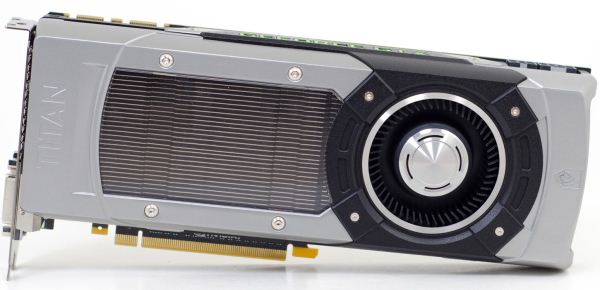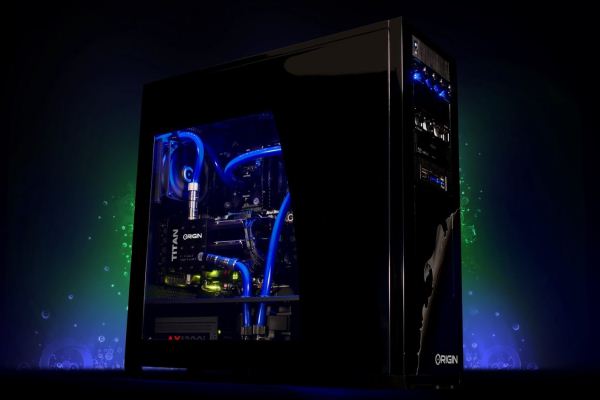NVIDIA’s GeForce GTX Titan Review, Part 2: Titan's Performance Unveiled
by Ryan Smith & Rahul Garg on February 21, 2013 9:00 AM ESTFinal Thoughts
Bringing things to a close, most of what we’ve seen with Titan has been a long time coming. Since the introduction of GK110 back at GTC 2012, we’ve had a solid idea of how NVIDIA’s grandest GPU would be configured, and it was mostly a question of when it would make its way to consumer hands, and at what clockspeeds and prices.
The end result is that with the largest Kepler GPU now in our hands, the performance situation closely resembles the Fermi and GT200 generations. Which is to say that so long as you have a solid foundation to work from, he who builds the biggest GPU builds the most powerful GPU. And at 551mm2, once more NVIDIA is alone in building massive GPUs.
No one should be surprised then when we proclaim that GeForce GTX Titan has unquestionably reclaimed the single-GPU performance crown for NVIDIA. It’s simply in a league of its own right now, reaching levels of performance no other single-GPU card can touch. At best, at its very best, AMD’s Radeon HD 7970GE can just match Titan, which is quite an accomplishment for AMD, but then at Titan’s best it’s nearly a generation ahead of the 7970GE. Like its predecessors, Titan delivers the kind of awe-inspiring performance we have come to expect from NVIDIA’s most powerful video cards.
With that in mind, as our benchmark data has shown, Titan’s performance isn’t quite enough to unseat this generation’s multi-GPU cards like the GTX 690 or Radeon HD 7990. But with that said this isn’t a new situation for us, and we find our editorial stance has not changed: we still suggest single-GPU cards over multi-GPU cards when performance allows for it. Multi-GPU technology itself is a great way to improve performance beyond what a single GPU can do, but as it’s always beholden to the need for profiles and the inherent drawbacks of AFR rendering, we don’t believe it’s desirable in situations such as Titan versus the GTX 690. The GTX 690 may be faster, but Titan is going to deliver a more consistent experience, just not quite at the same framerates as the GTX 690.
Meanwhile in the world of GPGPU computing Titan stands alone. Unfortunately we’re not able to run a complete cross-platform comparison due to Titan’s outstanding OpenCL issue, but from what we have been able to run Titan is not only flat-out powerful, but NVIDIA has seemingly delivered on their compute efficiency goals, giving us a Kepler family part capable of getting far closer to its theoretical efficiency than GTX 680, and closer than any other GPU before it. We’ll of course be taking a further look at Titan in comparison to other GPUs once the OpenCL situation is resolved in order to come to a better understanding of its relative strengths and weaknesses, but for the first wave of Titan buyers I’m not sure that’s going to matter. If you’re doing GPU computing, are invested in CUDA, and need a fast compute card, then Titan is the compute card CUDA developers and researchers have been dreaming of.
Back in the land of consumer gaming though, we have to contend with the fact that unlike any big-GPU card before it, Titan is purposely removed from the price/performance curve. NVIDIA has long wanted to ape Intel’s ability to have an extreme/luxury product at the very top end of the consumer product stack, and with Titan they’re going ahead with that.
The end result is that Titan is targeted at a different demographic than GTX 580 or other such cards, a demographic that has the means and the desire to purchase such a product. Being used to seeing the best video cards go for less we won’t call this a great development for the competitive landscape, but ultimately this is far from the first luxury level computer part, so there’s not much else to say other than that this is a product for a limited audience. But what that limited audience is getting is nothing short of an amazing card.
Like the GTX 690, NVIDIA has once again set the gold standard for GPU construction, this time for a single-GPU card. GTX 680 was a well-built card, but next to Titan it suddenly looks outdated. For example, despite Titan’s significantly higher TDP it’s no louder than the GTX 680, and the GTX 680 was already a quiet card. Next to price/performance the most important metric is noise, and by focusing on build quality NVIDIA has unquestionably set the new standard for high-end, high-TDP video cards.
On a final note, normally I’m not one for video card gimmicks, but after having seen both of NVIDIA’s Titan concept systems I have to say NVIDIA has taken an interesting route in justifying the luxury status of Titan. With the Radeon HD 7970 GHz Edition only available with open air or exotic cooling, Titan has been put into a position where it’s the ultimate blower card by a wide margin. The end result is that in scenarios where blowers are preferred and/or required, such as SFF PCs or tri-SLI, Titan is even more of an improvement over the competition than it is for traditional desktop computers. Or as Anand has so eloquently put it with his look at Falcon Northwest’s Tiki, when it comes to Titan “The days of a high end gaming rig being obnoxiously loud are thankfully over.”
Wrapping things up, on Monday we’ll be taking a look at the final piece of the puzzle: Origin’s tri-SLI full tower Genesis PC. The Genesis has been an interesting beast for its use of water cooling with Titan, and with the Titan launch behind us we can now focus on what it takes to feed 3 Titan video cards and why it’s an impeccable machine for multi-monitor/surround gaming. So until then, stay tuned.












337 Comments
View All Comments
ponderous - Thursday, February 21, 2013 - link
Cannot give kudos to what is a well performing card when it is so grosslyout of order in price for the performance. $1000 card for 35% more performance
than the $450 GTX680. A $1000 card that is 20% slower than the $1000 GTX690.
And a $1000 card that is 30% slower than a $900 GTX680SLI solution.
Meet the 'Titan'(aka over-priced GTX680).
Well here we have it, the 'real' GTX680 with a special name and a 'special'
price. Nvidia just trolled us with this card. It was not enough for them to
sell a mid-ranged card for $500 as the 'GTX680', now we have 'Titan' for twice
the price and an unremarkable performance level from the obvious genuine successor
to GF110(GTX580).
At this irrational price, this 'Titanic' amusement park ride is not one worth
standing in line to buy a ticket for, before it inevitably sinks,
along with its price.
wreckeysroll - Thursday, February 21, 2013 - link
now there is some good fps numbers for titan. we expected to see such. shocked to see it with the same performance as 7970ghz in that test although!much too much retail msrp for the card. unclear what nvidia was thinking. msrp is sitting far too high for this unfortunately
quantumsills - Thursday, February 21, 2013 - link
Wow....Some respectable performance turn-out here. The compute functionality is formidable, albeit the value of such is questionable in what is a consumer gaming card.
A g-note though ? Really nvidia ? At what degree of inebriation was the conclusion drawn that this justifies a thousand dollar price tag ?
Signed
Flabbergasted.
RussianSensation - Thursday, February 21, 2013 - link
Compute functionality is nothing special. Still can't bitcoin mine well, sucks at OpenCL (http://www.computerbase.de/artikel/grafikkarten/20... and if you need double precision, well a $500 Asus Matrix Platinum @ 1300mhz gives you 1.33 Tflops. You really need to know specific apps you are going to run on this like Adobe CS6 or very specific CUDA compute programs to make it worthwhile as a non-gaming card.JarredWalton - Thursday, February 21, 2013 - link
Really? People are going to trot out Bitcoin still? I realize AMD does well there, but if you're serious about BTC you'd be looking at FPGAs or trying your luck at getting one of the ASICs. I hear those are supposed to be shipping in quantity some time soon, at which point I suspect prices of BTC will plummet as the early ASIC owners cash out to pay for more hardware.RussianSensation - Thursday, February 28, 2013 - link
It's not about bitcoin mining alone. What specific compute programs outside of scientific research does the Titan excel at? It fails at OpenCL, what about ray-tracing in Luxmark? Let's compare its performance in many double precision distributed computing projects (MilkyWay@Home, CollatzConjecture), run it through DirectCompute benches, etc.http://www.computerbase.de/artikel/grafikkarten/20...
So far in this review covers the Titan's performance from specific scientific work done by universities. But those types of researchers get grants to buy full-fledged Tesla cards. The compute analysis in the review is too brief to conclude that it's the best compute card. Even the Elcomsoft password hashing - well AMD cards perform faster there too but they weren't tested. My point is it's not true to say this card is unmatched in compute. It's only true in specific apps. Also, leaving full double precision compute doesn't justify its price tag either since AMD cards have had non-gimped DP for 5+ years now.
maxcellerate - Thursday, March 28, 2013 - link
I tend to argee with RussianSensation, though the fact is that the first batch of Titans has sold out. But to who? There will be the odd mad gamer who must have the latest most expensive card in their rig, regardless. But I suspect the majority of sales have gone to CG renderers where CUDA still rules and $1000 for this card is a bargain compared to what they would have paid for it as a Quadra. Once sales to that market have dried up, the price will drop.Then I can have one;)
ponderous - Thursday, February 21, 2013 - link
True. Very disappointing card. Not enough performance for the exorbitant cost.Nvidia made a fumble here on the cost. Will be interesting to watch in the coming months where the sure to come price drops wind up placing the actual value of this card at.
CeriseCogburn - Saturday, February 23, 2013 - link
LOL - now compute doesn't matter - thank you RS for the 180 degree flip flop, right on schedule...RussianSensation - Thursday, February 28, 2013 - link
I never said compute doesn't matter. I said the Titan's "out of this world compute performance" needs to be better substantiated. Compute covers a lot of apps, bitcoin, openCL, distributed computing projects. None of these are mentioned.